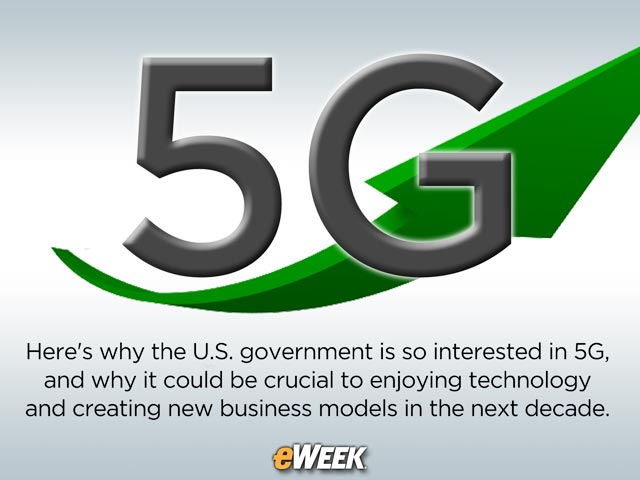eWEEK content and product recommendations are editorially independent. We may make money when you click on links to our partners. Learn More.
1What 5G Technology Promises to Bring to Wireless Networks
2Why the Government and Businesses Are Excited by 5G
If 5G wireless connectivity goes on the air as planned over the next five years, it is apt to be one of most important technological innovations of the decade. Essentially, 5G is the next iteration of cellular connectivity that will launch across the U.S. and around the world. It’s estimated that 5G will deliver faster data transmission rates than the current standard, 4G, with far less latency. It can be beamed across a wider swath of land to reach more users.
3Speeds Will Be Dramatically Improved
4It Promises to Deliver a Truly Nationwide Wireless Network
There’s a chance that 5G technology could change how people access the Internet in their homes. If 5G becomes ubiquitous and it really is as fast as service providers predict, there’s a good chance that many folks will turn to those telecoms for Internet access rather than stick with slower cable access. Best of all, it’ll be wireless, so devices can connect without a tether. The opportunity for 5G to become a national wireless service is real.
5It Prepares the World for the Internet of Things
The Internet of things is already exploding, but there’s limited bandwidth and concern that without advanced wireless technology, there simply won’t be enough bandwidth to handle all those devices. That’s where 5G comes in. With 5G, the industry will have the extra speed and bandwidth to accommodate the enormous growth of the Internet of things.
6Here’s How Enterprises Could Benefit
The corporate world is likely to be one of the earlier and biggest benefactors of 5G technology. Companies behind the technology believe that the enterprise will use 5G to more quickly transfer data, hold more video conferences and perhaps even create new business models based on remote wireless access.
7Enterprises Are Exploring Potential Business Opportunities
You can assume that just about every major IT company is interested in jumping into the 5G market. Google is exploring the possibility of using drones to beam 5G down to devices. Meanwhile, Ericsson, AT&T, Intel, Verizon and countless others are all at least researching and testing the technology. They all agree that 5G is critical to the future of technology and connectivity.
8Emerging Markets Will Be Far Behind
Once again, emerging markets aren’t likely to see the benefits of 5G as quickly as those in developed countries; however, emerging markets likely would have the most to gain from it. While 5G might only be a few years away in the U.S., in countries such as China, where 4G LTE rollouts are still going on, 5G is a ways off. It’s even worse in rapidly developing regions such as India and South America. Unfortunately, 5G could end up creating a deeper digital divide between developed and emerging countries than already exists.
9But This Is a Worldwide Initiative
While the U.S. is moving quickly into 5G, it’s not alone. Industrialized nations such as South Korea, have already said they, too, are working on deploying 5G. In addition, the European Union has diverted significant sums of cash to test and deploy 5G across the Eurozone. Expect the U.S., Korea, and the EU to become 5G’s early adopters.
10IT Will Be Important for Connected and Self-Driving Vehicles
Connected cars and self-driving cars will really need 5G technology to work successfully. The dramatic reduction in latency that 5G will bring (down to one millisecond, which is much lower than 4G LTE) means connected cars could tell other cars on the road where they are, where they’re going and react accordingly. The greater the latency, the greater the chance that self-driving cars won’t react in time to avoid collisions. It’s possible that 5G could significantly speed up the development and deployment of self-driving cars.
11When Will It Actually Launch?
The million-dollar question is when 5G will actually launch. As of this writing, there are no industry standards on the technology, which could take years to adopt. However, the FCC believes that 5G networks will start to come online by 2020 and slowly roll out from there. But as history has shown, new wireless rollouts take years, so there is no predicting when 5G wireless will actually be available in your city.










